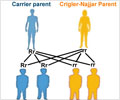In an international study led by Mayo Clinic scientists, researchers have discovered the first mutated gene, called MEIS1, which is linked to restless legs syndrome, a common neurologic disorder.
Researchers have discovered the first mutated gene, called MEIS1, linked to restless legs syndrome, a common neurologic disorder. These results were published in an international study led by Mayo Clinic scientists.
The researchers have said that a large proportion of the millions of people who suffer from the syndrome have this mutated MEIS1 gene.However, they pointed out that understanding the function of both normal and abnormal genes would shed some insights into this mysterious disorder.
Restless legs syndrome is characterized by unpleasant sensations in the legs at rest, especially in the evening, that are temporarily relieved by movement.
Because restless legs syndrome often interrupts sleep, people commonly are diagnosed after they consult a sleep specialist for assistance.
"We think restless legs syndrome may be due to a number of clinical factors, but we also believe that there is a strong genetic component to the disorder," said the study's lead investigator, Dr. Carles Vilarino-Guell.
He added: "The mutation we found is in a portion of the protein that is identical in species as distinct to human as frogs and fish, which tells us that this portion is very important for the proper function of the protein and that the mutation has a very high chance of causing disease."
"This mutation, on the other hand, is the first that we think can be a real candidate for causing or promoting restless legs syndrome," he added.
The family that has the MEIS1 mutation consists of six members-three who had restless legs syndrome had the mutation and the other three without the disease did not.
"The presence of the mutation in all affected individuals supports a pathogenic role for the MEIS1 gene, and we now need to confirm this finding with other international research groups who study restless legs syndrome," said Vilarino-Guell.
The study has been published in the journal Neurology.
Source-ANI
TAN
 MEDINDIA
MEDINDIA




 Email
Email










